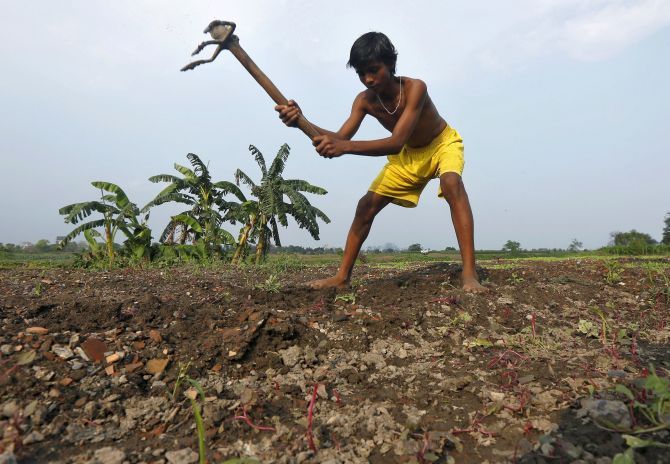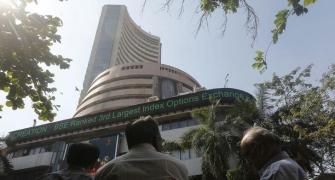From NITI Aayog to industry leaders to the Reserve Bank of India, all are apprehensive that any major increase in MSP, following the 2018-19 Budget announcements, would push up prices, if not immediately, in the next six to eight months after the decision is taken.

To what extent will the government’s efforts to increase minimum support prices and spread their benefits translate into food inflation? And if they do, which are the crops that will be instrumental in pushing the price level up?
From NITI Aayog to industry leaders to the Reserve Bank of India, all are apprehensive that any major increase in MSP, following the 2018-19 Budget announcements, would push up prices, if not immediately, in the next six to eight months after the decision is taken.
The RBI, in its monetary policy, has said the revised formula for MSP might have an impact on inflation.
However, there also are opposite views.
Some experts say that the inflationary impact of the government guaranteeing an MSP that’s 50 per cent more than the A2+FL cost (costs paid and family labour) won’t be uniform and will be crop-specific for a temporary period. The government can address this through increases in supply, either domestically or through more import.
“In many commodities the current MSP is more than the A2+FL production cost, hence there won't be an inflationary impact in them, while in others there could some rise in prices,” Ashok Dalwai, chief executive officer, National Rainfed Area Authority, told Business Standard. He said it was time the consumer-centric approach to farm policies changed.
A case in point as to how higher MSPs could affect inflation is maize.
The MSP for maize in the 2017-18 kharif season has been fixed at Rs 1,425 per quintal, while the A2+FL cost of production is Rs 1,044 per quintal. This means an average return of around 36.49 per cent.
To fulfil the government’s promise, the MSP for maize in the coming kharif season onwards (2018-19) has to go up by 14.5 per cent. This, many experts say, is bound to push up maize prices in the domestic market and also those of supplementary industries such as feed and poultry.
But, the counter view to this is that the farm harvest price of many crops in India has been more than the MSP though 2016 has been a big exception. When prices fetched outside the MSP system are higher, why would anybody bother what happens to MSP?
A recent NITI Aayog paper suggested models of procurement, and advocated better markets and reducing the gap between producer and consumer to prevent prices from flaring up.
The data shows that of the 23 major crops for which Centre declares MSP, the rates of almost 13 need to be raised from the coming kharif harvest season to fulfil the Centre’s promise of guaranteeing a return that is 50 per cent more than the A2+FL cost.
Of those, the maximum increase (that is more than 30 per cent) has to be in the MSPs for ragi, jowar, sunflower seed and niger seed.
The current MSP for ragi is around Rs 1,900 per quintal, while the A2+FL cost is estimated to be Rs 1,861 per quintal, giving a return of just 2.10 per cent over cost.
This means to match the 2018-19 Budget announcement the government will have to raise its MSP by a whopping 48 per cent. Now, how much that will push up ragi prices in the local market remains to be seen.
The MSP for medium staple cotton has to rise by 27 per cent and that of long staple by 18 per cent.
“The inflationary impact due to increased MSPs would largely be crop-specific. In wheat and rice, the public distribution system would support any inflationary impact, while in others imports can be an option and domestic supplies are also good enough,” P K Joshi, South-Asia director of the International Food Policy Research Institute, tells Business Standard.
Madan Sabnavis, chief economist of CARE Ratings, too says there won’t be a big uniform rise in inflation if MSPs are raised by 50 per cent over the A2+FL cost. However, former agriculture secretary Shiraz Hussain thinks otherwise.
“In six to eight months they are bound to push up prices when rural markets recover,” Hussain said.
He said in crops like cotton, any arbitrary increase in MSP without looking at market dynamics will kill its international demand.
Hussain, along with the former chairman of the Commission for Agriculture Costs and Prices, in a recent policy paper for the Indian Council for Research on International Economic Relations, said that only cost plus pricing (1.5 times the cost A2+FL), which ignores the demand side, will lead to large-scale distortions.
Photograph: Rupak De Chowdhuri/Reuters.










